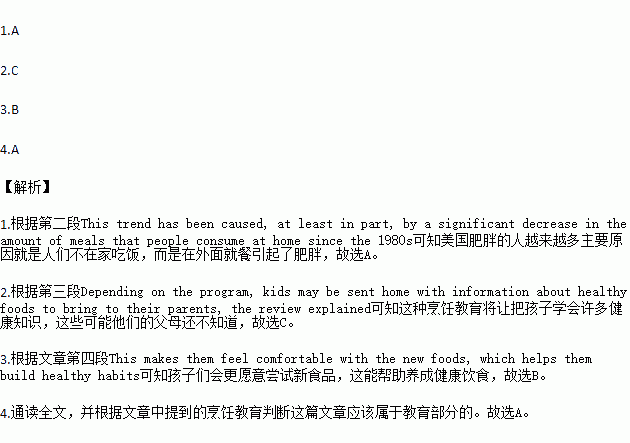题目内容
Want Kids to Eat Better? Get Them Cooking
Cooking programs and classes for children seem to positively influence children's food preferences and behaviors, according to a recent review. And, although the review didn't look at long-term effects of such programs, the findings suggest that such programs might help children develop long-lasting healthy habits.
This research comes at a time when childhood obesity(肥胖)rates have been rising rapidly. More than one-third of adolescents in the United States were obese in 2012, according to the U.S. Centers for Disease Control and Prevention (CDC). This trend has been caused, at least in part, by a significant decrease in the amount of meals that people consume at home since the 1980s, according to background information in the study.
Cooking education programs, such as Food Explorers, teach children about new healthy foods and how to prepare them. They also stress the importance of eating five fruits and vegetables every day. A volunteer parent explains a new food to the group, and the kids make something based on the lesson, such as fruit or vegetable salad. Depending on the program, kids may be sent home with information about healthy foods to bring to their parents, the review explained.
The study team reviewed eight other studies that tested different types of cooking education programs. Children in these classes were between 5 and 12 years old, according to the review. The goal of the study team was to learn more about developing an efficient program to encourage healthy food choices that last a lifetime. The study found that it is particularly important to expose kids to healthy foods on a number of occasions. This makes them feel comfortable with the new foods, which helps them build healthy habits.
The study stressed the importance of getting parents involved in(参与)their children's eating habits. Parents who are unable to enroll their kids in a cooking class can achieve similar benefits by having their kids help them while they prepare meals at home. Children are more comfortable at home, which makes them more receptive to new foods because they will make the connection to a positive experience.
1.What can we infer from the second paragraph?
A. Eating out frequently causes obesity.
B. Childhood obesity is totally caused by eating habit.
C. Childhood obesity rates have been rising rapidly since 2012
D. Food consumption has decreased significantly since the 1980s
2.On cooking education programs, ________.
A. children learn how to prepare foods from their parents
B. children will learn how to cook in the company of their parents
C. children may learn information unknown to their parents
D. children focus more on cooking skills than on information about healthy foods
3.Which of the following is true according to the study?
A. Parents should let their kids cook independently at home.
B. A greater willingness to try new foods helps building healthy habits.
C. Children who participate in cooking programs are less likely to become obese.
D. Children who take cooking courses are more likely to choose fruits and vegetables as adults
4.Which of the following categories does this passage belong to?
A. Education Systems
B. Science and Technology
C. Parent-child Relationship
D. Public Health Research
 名校课堂系列答案
名校课堂系列答案
